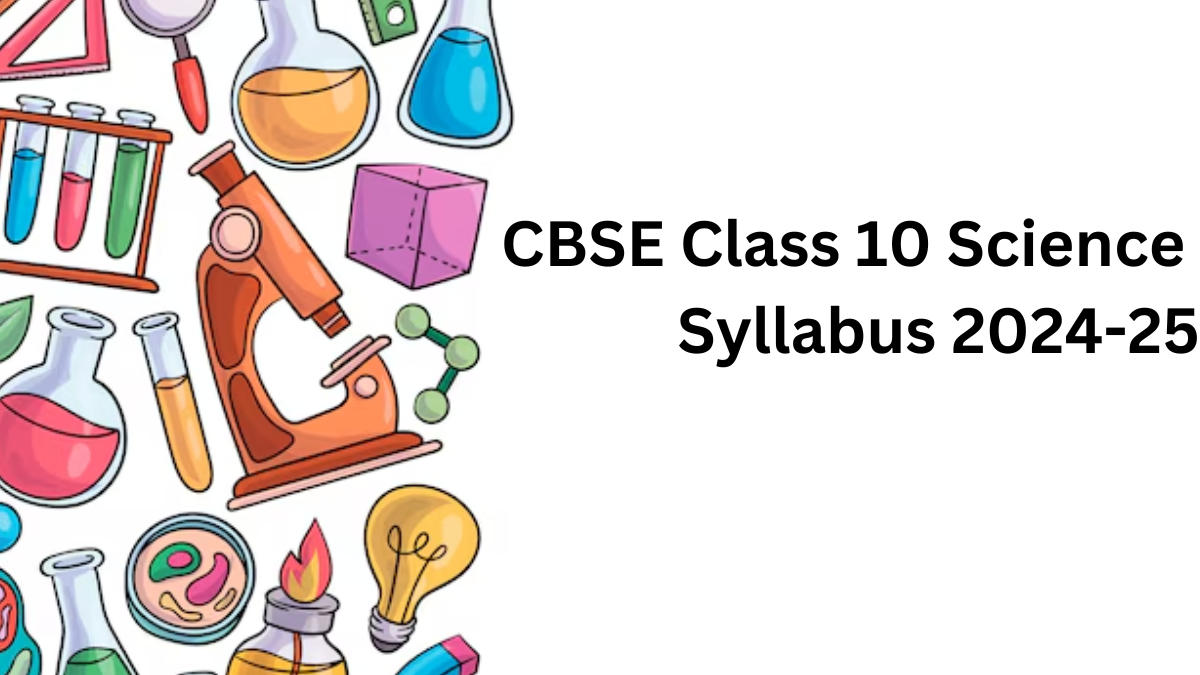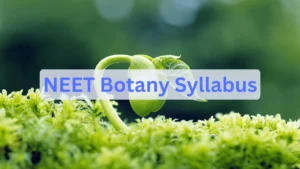Table of Contents
CBSE Class 10 Science syllabus 2024-25 has been officially posted on the board’s official website, cbse.gov.in. Science helps children develop well-defined talents in the cognitive, emotional, and psychomotor domains. The Syllabus of Class 10 Science 2024-25 covers all of the major topics, as well as new additions and eliminated content, to ensure that you have the most up-to-date information. Students can download the CBSE Class 10 Science syllabus 2025 PDF, given on this page to learn and prepare for the exams systematically.
CBSE Class 10 Science Syllabus 2024-25
Students should go through the CBSE Class 10 Science Syllabus to learn about units, topics, and marks allotted for each unit for better exam preparation. The syllabus covers seven basic themes: Food, Materials, The World of Living, How Things Work, Moving Things, People and Ideas, Natural Phenomena, and Natural Resources.
The Science Class 10 Syllabus also includes details about practicals, assignments, and projects so that students can understand the concepts they are learning effectively. CBSE syllabus for Class 10 Science is designed in such a way that it helps students to plan their study plan according to the board exams. Downloading the syllabus will help you plan your studies more effectively, grasp the updated assessment methods, and perform well in your exams
Syllabus of Class 10 Science 2024-25 Marks Breakdown
The CBSE syllabus for Class 10 Science is created in such a way that students can arrange their study schedules based on the board exams. Students should review the CBSE Class 10 Science Syllabus to learn about the units, subjects, and marks assigned to each unit for better exam preparation
| CBSE Class 10 Science Syllabus: Unit-wise Weightage | ||
| S. No. | Unit | Marks |
| 1 | I. Chemical Substances-Nature and Behaviour | 25 |
| 2 | II. World of Living | 25 |
| 3 | III. Natural Phenomena | 12 |
| 4 | IV. Effects of Current | 13 |
| 5 | V. Natural Resources | 5 |
| Total | 80 | |
Latest|Class 10 Science Sample Paper 2024-25 with Solutions PDF Out
CBSE Class 10 Science Syllabus 2024-25 Chapter wise
There are a total of five units included in the CBSE Class 10 Science syllabus 2025. All the units are crucial and carry good Weightage in the board exam. As each unit includes several concepts, students should carefully and meticulously complete all the units.
Unit I: Chemical Substances – Nature and Behaviour
| Topics | Sub Topics |
| Chemical Reactions | Chemical equation, Balanced chemical equation, implications of a balanced chemical equation, types of chemical reactions: combination, decomposition, displacement, double displacement, precipitation, endothermic exothermic reactions, oxidation, and reduction. |
| Acids, bases, and salts: | Their definitions in terms of furnishing of H+ and OH– ions, General properties, examples and uses, neutralization, concept of pH scale (Definition relating to logarithm not required), importance of pH in everyday life; preparation and uses of Sodium Hydroxide, Bleaching powder, Baking soda, Washing soda and Plaster of Paris. |
| Metals and nonmetals: | Properties of metals and non-metals; Reactivity series; Formation and properties of ionic compounds; Basic metallurgical processes; Corrosion and its prevention. |
| Carbon compounds: Covalent bonding in carbon compounds. Versatile nature of carbon. Homologous series. Nomenclature of carbon compounds containing functional groups (halogens, alcohol, ketones, aldehydes, alkanes, and alkynes), the difference between saturated hydrocarbons and unsaturated hydrocarbons. Chemical properties of carbon compounds (combustion, oxidation, addition and substitution reaction). Ethanol and Ethanoic acid (only properties and uses), soaps and detergents. |
Unit II: World of Living
| Theme: The World of the Living |
|
| Topics | Sub Topics |
| Life processes: | ‘Living Being’. The basic concept of nutrition, respiration, transport, and excretion in plants and animals. |
| Control and co-ordination in animals and plants: | Tropic movements in plants; Introduction of plant hormones; Control and coordination in animals: Nervous system; Voluntary, involuntary and reflex action; Chemical coordination: animal hormones. |
| Reproduction: | Reproduction in animals and plants (asexual and sexual) reproductive health – need and methods of family planning. Safe sex vs HIV/AIDS. Child bearing and women’s health. |
| Heredity and Evolution: | Heredity; Mendel’s contribution- Laws for inheritance of traits: Sex determination: brief introduction: (topics excluded – evolution; evolution and classification and evolution should not be equated with progress). |
Unit III: Natural Phenomena
| Theme: Natural Phenomena | |
| Topics | Sub Topics |
| Reflection of light | Reflection of light by curved surfaces; Images formed by spherical mirrors, centre of curvature, principal axis, principal focus, focal length, mirror formula (Derivation not required), magnification. |
| Refraction of light | Refraction; Laws of refraction, refractive index. Refraction of light by spherical lens; Image formed by spherical lenses; Lens formula (Derivation not required); Magnification. Power of a lens. |
| Human Eye | Functioning of a lens in the human eye, defects of vision and their corrections, and applications of spherical mirrors and lenses. |
| Prism | Refraction of light through a prism, dispersion of light, scattering of light, applications in daily life (excluding colour of the sun at sunrise and sunset). |
Unit IV: Effects of Current
| Topics | Sub Topics |
| Electric current | Electric current, potential difference and electric current. Ohm’s law; Resistance, Resistivity, Factors on which the resistance of a conductor depends. Series combination of resistors, parallel combination of resistors and its applications in daily life. Heating effect of electric current and its applications in daily life. Electric power, Interrelation between P, V, I and R. |
| Magnetic effects of current: | Magnetic field, field lines, field due to a current carrying conductor, field due to current carrying coil or solenoid; Force on current carrying conductor, Fleming’s Left Hand Rule, Direct current. Alternating current: frequency of AC. Advantage of AC over DC. Domestic electric circuits. |
Unit V: Natural Resources
| Theme: Natural Resources | |
| Topics | Sub Topics |
| Our environment: | Eco-system, Environmental problems, Ozone depletion, waste production and their solutions. Biodegradable and non-biodegradable substances. |
Note for the Teachers:
1. The chapter Management of Natural Resources (NCERT Chapter 16) will not be assessed in the year-end examination. However, learners may be assigned to read this chapter and encouraged to prepare a brief write up to any concept of this chapter in their Portfolio. This may be for Internal Assessment and credit may be given Periodic Assessment/Portfolio).
2. The NCERT text books present information in boxes across the book. These help students to get conceptual clarity. However, the information in these boxes would not be assessed in the year-end examination.
CBSE Class 10 Science Syllabus 2025 for Practicals
Practicals should be conducted alongside the concepts taught in theory classes. Check out the list of suggested experiments prescribed in the official syllabus 2024-25
| LIST OF EXPERIMENTS |
| 1. A. Finding the pH of the following samples by using pH paper/universal indicator: (Unit-I) (i) Dilute Hydrochloric Acid (ii) Dilute NaOH solution (iii) Dilute Ethanoic Acid solution (iv) Lemon juice (v) Water (vi) Dilute Hydrogen Carbonate solution |
| 1. B. Studying the properties of acids and bases (HCl & NaOH) on the basis of their reaction with: (Unit-I) a) Litmus solution (Blue/Red) b) Zinc metal c) Solid sodium carbonate |
| 2. Performing and observing the following reactions and classifying them into: (Unit-I) A. Combination reaction B. Decomposition reaction C. Displacement reaction D. Double displacement reaction (i) Action of water on quicklime (ii) Action of heat on ferrous sulphate crystals (iii) Iron nails kept in copper sulphate solution (iv) Reaction between sodium sulphate and barium chloride solutions |
| 3. Observing the action of Zn, Fe, Cu and Al metals on the following salt solutions: (Unit-I) i) ZnSO4(aq) ii) FeSO4(aq) iii) CuSO4(aq) iv) Al2 (SO4)3(aq) Arranging Zn, Fe, Cu and Al (metals) in the decreasing order of reactivity based on the above result. |
| 4. Studying the dependence of potential difference (V) across a resistor on the current (I) passing through it and determine its resistance. Also plotting a graph between V and I. (Unit-IV) |
| 5. Determination of the equivalent resistance of two resistors when connected in series and parallel. Unit-IV |
| 6. Preparing a temporary mount of a leaf peel to show stomata. Unit- II |
| 7. Experimentally show that carbon dioxide is given out during respiration. Unit-II |
| 8. Study of the following properties of acetic acid (ethanoic acid): Unit- I i) Odour ii) solubility in water iii) effect on litmus iv) reaction with Sodium Hydrogen Carbonate |
| 9. Study of the comparative cleaning capacity of a sample of soap in soft and hard water. (Unit- I) 10. Determination of the focal length of: (Unit-III) i) Concave mirror ii) Convex lens by obtaining the image of a distant object. |
| 11. Tracing the path of a ray of light passing through a rectangular glass slab for different angles of incidence. Measure the angle of incidence, angle of refraction, angle of emergence and interpret the result. (Unit – III) |
| 12. Studying (a) binary fission in Amoeba, and (b) budding in yeast and Hydra with the help of prepared slides. (Unit-II) |
| 13. Tracing the path of the rays of light through a glass prism. (Unit-III) |
| 14. Identification of the different parts of an embryo of a dicot seed (Pea, gram or red kidney bean). (Unit-II) |
CBSE Class 10 Science Syllabus 2024-25 PDF Download
The board has released the Science Class 10 Syllabus for the 2024-25 Session along with all major subjects in PDF format. For future reference, students can download the CBSE Class 10 Science Syllabus 2024-25 pdf by visiting the official website of CBSE or using the direct link shared here under.
CBSE Class 10 Science Syllabus 2024-25 PDF download
General Instructions releated to CBSE Class 10 Science Syllabus 2024-25
1. There will be an Annual Examination based on the entire syllabus.
2. The Annual Examination will be of 80 marks and 20 marks weightage shall be for Internal
Assessment.
3. For Internal Assessment:
a. There will be Periodic Assessment that would include:
- For 5 marks- Three periodic tests conducted by the school. Average of the best two tests
to be taken that will have a weightage of 05 marks towards the final result. - For 5 marks- Diverse methods of assessment as per the need of the class dynamics and curriculum transaction. These may include – short tests, oral test, quiz, concept maps, projects, posters, presentations and enquiry based scientific investigations etc. and use rubrics for arguing them objectively. This will also have a weightage of 05 marks towards the final result.
b. Practical / Laboratory work should be done throughout the year and the student should maintain
record of the same. Practical Assessment should be continuous. There will be weightage of 5 marks towards the final result. All practicals listed in the syllabus must be completed.
c. Portfolio to be prepared by the student- This would include classwork and other sample of student work and will carry a weightage of 5 marks towards the final results.
Prescribed Books for Class 10 Science
Here is a list of prescribed books that will benefit recovering all the topics included in the CBSE Class 10 Science Syllabus 2025.
- Science-Textbook for class IX-NCERT Publication
- Science-Text book for class X- NCERT Publication
- Assessment of Practical Skills in Science-Class IX – CBSE Publication
- Assessment of Practical Skills in Science- Class X- CBSE Publication
- Laboratory Manual-Science-Class IX, NCERT Publication
- Laboratory Manual-Science-Class X, NCERT Publication
- Exemplar Problems Class IX – NCERT Publication
- Exemplar Problems Class X – NCERT Publication
| Class 10 Other Subject Syllabus | |
| Class 10 English Syllabus PDF | Class 10 Hindi Syllabus PDF |
| Class 10 Maths Syllabus PDF | |




 NEET Biology Syllabus 2025 (Official), D...
NEET Biology Syllabus 2025 (Official), D...
 CUET General Test Syllabus 2025, Downloa...
CUET General Test Syllabus 2025, Downloa...
 NEET Botany Syllabus 2025 Out, Check Cha...
NEET Botany Syllabus 2025 Out, Check Cha...










